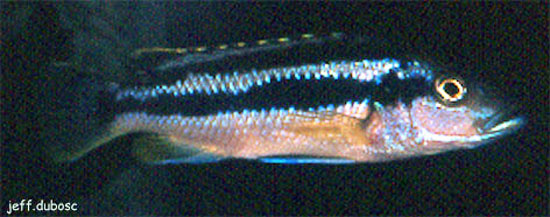| Cichlidae (Cichlids), subfamily: Pseudocrenilabrinae |
| 10.42 cm SL (male/unsexed) |
|
benthopelagic; freshwater; depth range 5 - 40 m |
| Africa: endemic to Lake Malawi (Ref. 80784, 89864). |
|
Melanochromis kaskazini is distinguished from all congeners except M. lepidiadaptes by its territorial male coloration, because it exhibits incomplete reverse male-female stripe coloration. Males are cobalt blue and lack any light colored mid-lateral or dorso-lateral stripe. Females are distinguished from other
Melanochromis, except M. parallelus, M. heterochromis, M. lepidiadaptes, M. melanopterus, and M. simulans, by a white body color, and differ from these five species by a yellow/orange anal fin, which is white with a black submarginal band in the others. Male M. kaskazini with breeding coloration are distinguished from those of M. lepidiadaptes by a shallower preorbital (21.9 % vs. 31.8 % HL; ranges: 19.3–26.9 vs. 26.9–35.6), a longer head (34.9 % vs. 31.9 % SL; ranges: 33.6–37.8 vs. 28.4–36.4), a shorter post-orbital head length (42.4 % vs. 47.8 % HL; ranges: 38.4–44.6 vs. 41.8–52.1), and a longer lower jaw (40.3 % vs. 36.8 % HL; ranges: (36.4–44.6 vs. 32.2–40.1). |
| Inhabits the intermediate habitat; not territorial; hunts larger invertebrates and small fishes; small foraging groups frequently seen (Ref. 80784). |
|
Least Concern (LC); Date assessed: 22 June 2018 Ref. (130435)
|
| harmless |
Source and more info: www.fishbase.org. For personal, classroom, and other internal use only. Not for publication.

